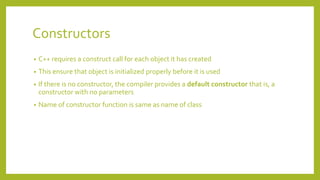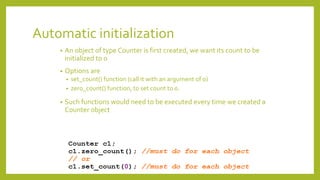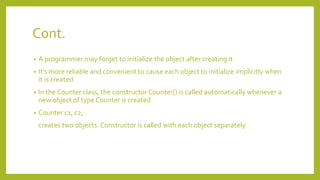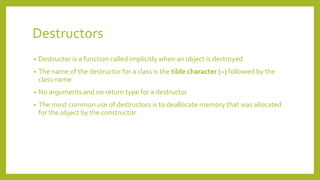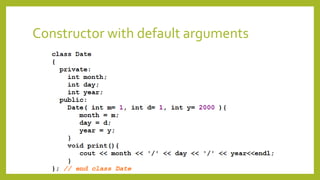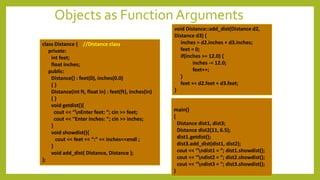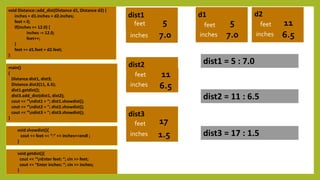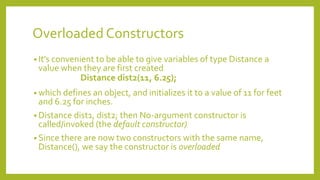Oop presentation
- 1. CONSTRUCTORS & DESTRUCTORS #109 Rimsha Nasrallah #118 shamsa Nawaz #139 Sana Khalid
- 2. Constructors ? C++ requires a construct call for each object it has created ? This ensure that object is initialized properly before it is used ? If there is no constructor, the compiler provides a default constructor that is, a constructor with no parameters ? Name of constructor function is same as name of class
- 3. A counter example ? Data member ? Count ? Member function ? Constructor ? void inc_count() ? int get_count()
- 4. Automatic initialization ? An object of type Counter is first created, we want its count to be initialized to 0 ? Options are ? set_count() function (call it with an argument of 0) ? zero_count() function, to set count to 0. ? Such functions would need to be executed every time we created a Counter object
- 5. Cont. ? A programmer may forget to initialize the object after creating it ? It¡¯s more reliable and convenient to cause each object to initialize implicitly when it is created ? In the Counter class, the constructor Counter() is called automatically whenever a new object of type Counter is created ? Counter c1, c2; creates two objects. Constructor is called with each object separately
- 6. Constructor Name ? First, constructor name must be same as the name of class ? This is one way the compiler knows they are constructors ? Second, no return type is used for constructors ? Why not? Since the constructor is called automatically by the system, there¡¯s no program for it to return anything to; a return value wouldn¡¯t make sense ? This is the second way the compiler knows they are constructors
- 7. Initializer List ? One of the most common tasks a constructor carries out is initializing data members ? In the Counter class the constructor must initialize the count member to 0 ? The initialization takes place following the member function declarator but before the function body. ? Initialization in constructor¡¯s function body Counter() { count = 0; } this is not the preferred approach
- 8. Cont. ? It¡¯s preceded by a colon.The value is placed in parentheses following the member data. Counter() : count(0) { } ? If multiple members must be initialized, they¡¯re separated by commas. ? someClass() : m1(7), m2(33), m3(4) ¡ûinitializer list { }
- 9. Destructors ? Destructor is a function called implicitly when an object is destroyed ? The name of the destructor for a class is the tilde character (~) followed by the class name ? No arguments and no return type for a destructor ? The most common use of destructors is to deallocate memory that was allocated for the object by the constructor
- 10. Validating Data with set Functions ? A set function should validate the value before assigning to private data member ? Set function can return a value or may display a message if invalid data is assign to object
- 11. Constructor with default arguments
- 12. Objects as Function Arguments class Distance { //Distance class private: int feet; float inches; public: Distance() : feet(0), inches(0.0) { } Distance(int ft, float in) : feet(ft), inches(in) { } void getdist(){ cout << ¡°nEnter feet: ¡°; cin >> feet; cout << ¡°Enter inches: ¡°; cin >> inches; } void showdist(){ cout << feet << ¡°:¡± << inches<<endl ; } void add_dist( Distance, Distance ); }; void Distance::add_dist(Distance d2, Distance d3) { inches = d2.inches + d3.inches; feet = 0; if(inches >= 12.0) { inches -= 12.0; feet++; } feet += d2.feet + d3.feet; } main() { Distance dist1, dist3; Distance dist2(11, 6.5); dist1.getdist(); dist3.add_dist(dist1, dist2); cout << ¡°ndist1 = ¡°; dist1.showdist(); cout << ¡°ndist2 = ¡°; dist2.showdist(); cout << ¡°ndist3 = ¡°; dist3.showdist(); }
- 13. feet inches dist1 0 0.0 `feet inches dist3 0 0.0 feet inches dist2 11 6.5 5 7.0 feet inches d1 feet inches d2 5 7.0 11 6.5 13.5 0 1.5 117 main() { Distance dist1, dist3; Distance dist2(11, 6.5); dist1.getdist(); dist3.add_dist(dist1, dist2); cout << ¡°ndist1 = ¡°; dist1.showdist(); cout << ¡°ndist2 = ¡°; dist2.showdist(); cout << ¡°ndist3 = ¡°; dist3.showdist(); } void getdist(){ cout << ¡°nEnter feet: ¡°; cin >> feet; cout << ¡°Enter inches: ¡°; cin >> inches; } void Distance::add_dist(Distance d1, Distance d2) { inches = d1.inches + d2.inches; feet = 0; if(inches >= 12.0) { inches -= 12.0; feet++; } feet += d1.feet + d2.feet; } void showdist(){ cout << feet << ¡°:¡± << inches<<endl ; } dist1 = 5 : 7.0 dist2 = 11 : 6.5 dist3 = 17 : 1.5
- 14. Overloaded Constructors ? It¡¯s convenient to be able to give variables of type Distance a value when they are first created Distance dist2(11, 6.25); ? which defines an object, and initializes it to a value of 11 for feet and 6.25 for inches. ? Distance dist1, dist2; then No-argument constructor is called/invoked (the default constructor) ? Since there are now two constructors with the same name, Distance(), we say the constructor is overloaded
- 15. Member Functions Defined Outside the Class ? Such functions, needs to have a prototype/declaration within the class ? The function name, add_dist(), is preceded by the class name, Distance, and a new symbol¡ªthe double colon (::).This symbol is called the scope resolution operator. ? It is a way of specifying what class something is associated with ? In this situation, Distance::add_dist() means ¡°the add_dist() member function of the Distance class¡± void Distance::add_dist(Distance d2, Distance d3)
- 16. Questions??

